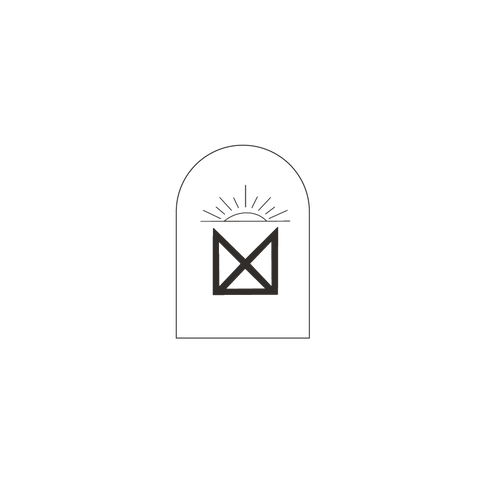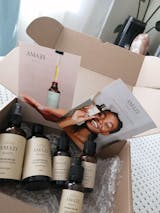Part 1: Be okay with not being okay
I woke up today* (Monday, 12th July) and felt a weight on my chest. I tried to tell myself to be brave and get through the list of calls I needed to take. I needed to check in with my family to make sure they were safe. I sent messages to friends to check that they were safe. I needed to talk to my team and support them as we plan how to temporarily close our locations and take our efforts online. I kept telling myself to keep it together for just one more conversation. And then, at 11:30, I couldn’t. I sat on my couch, and I froze. I felt my throat close up, and tears rolled down my cheeks. I couldn’t move.
*Context for those who are not in South Africa - violent riots and looting spread across our country. Shopping malls, hospitals, clinics, blood banks were raided and set on fire. Police forces were completely overwhelmed and, for the most part, helpless against thousands storming and overtaking public spaces. By the evening, home invasions in certain parts of the country had begun.
After a few minutes, I saw a message ping through on my phone. I just couldn’t bring myself to look at it because what if it was bad news? What if someone I care about was in danger? What if someone needed me and I can’t do anything? I just closed my eyes and told myself to breathe. After a few more minutes, I looked at my messages and, thankfully, it was a team member reaching out to ask if we can pause meetings for the rest of the day because she was also stuck in the heaviness. I realised I needed to cancel the rest of my afternoon because I just couldn’t bring myself to talk to anyone. I didn’t have words. I felt like if I tried to speak, nothing would come out except tears.
I decided to plant myself on my yoga mat. As I closed my eyes, I realised I was heading into a conversation with Sihle Bolani on IG this evening. A conversation I was so looking forward to with a woman I so deeply admire. Another wave of anxiety swept over me. Could I show up for a conversation on a topic I am so passionate about? Could I show up and engage in the way I wanted to?
I know I’m wrestling with how I feel. I’m wrestling with the conversations I’ve had with people I care about, hearing the fear, the anxiety and the exhaustion in their voices. I’m wrestling with the choices I’ve made and continue to make to believe in change. I’m wrestling with whether I want to keep trying. I’m wrestling with the urge to just check out of engaging with people. I’m wrestling with whether I still have a 'fight' in me.
I reach for my phone to change my music; the “Healing Hypnosis” track isn’t working for me. I change to a track called “Between Worlds”. Just as I click play, I see a message from someone in my team saying, “If I didn’t have this Tribe to lean on, I don’t think I could make it through today.” I know I shouldn’t open it because I should be meditating but screw it. I open the message, and I am instantly brought back to the reason why I wanted to create this glorious Tribe. I don’t need to have answers. I don’t need to be okay. This incredible Tribe of women find the strength, not in me, but in the idea that, collectively, our intent will create a community bigger than any one of us capable of bringing about change. I know, as a collective, we are not giving up. Even if, at this moment, as an individual, I am not okay. Some deep breathes as I put my phone down and press play for the sounds of “Between Worlds” to take over.
Part 2: It’s okay to admit you care more about convenience than consciousness.
I decided to wash my face, change out of my hoodie and step into the conversation with Sihle with gratitude for the space she was creating for me. And 'f**k it' was exactly what I needed on this insanely emotional Monday. I’ve had the pleasure of speaking to Sihle a few times now, and I forgot how calming & centering her energy is. Her voice alone is so soothing that from the time she said “Hi Div”, I automatically felt my shoulders release.
For anyone who hasn’t had a chance to catch our conversation, head over to IG and check it out under @Sihlebolani’s IGTV. We spoke about why AMAZI SHEtribe isn’t a business; it’s an ecosystem. Calling us a business oversimplifies what we are trying to achieve. We’re an ecosystem, and we’re running multiple models. Our ecosystem has 2 main drivers: our internal customer (women who come into our community looking for access to skills & earning opportunities) and our external customer (women who choose to purchase their self-care needs through us). Our ecosystem thrives when we have growing external customers who spend with us and help us direct funds to the growing community of internal customers needing our support.
For the longest time, we’ve been navigating the imbalance between having so many more internal customers than we do external customers. At any given time, we have close to a thousand women wanting to apply for any one of our skill programs, but not enough external customers spending with us that would allow us to sustainably support such large numbers of excluded women. It’s a daily conflict that we keep working on. If only it were as simple as just growing our external customer base, but that would require more and more women to follow through on their intent to be conscious.
In our conversation, Sihle reminded me that we began talking about conscious consumption on her podcast: The Workplace Revolution. Her work, and ours at AMAZI, relies on more women tapping into their economic power by being conscious of how and where they spend. I’ve had moments of sheer exasperation where I question why I have so much faith in women as a community. Then, I think about what it means about my faith in myself as a brown woman.
Soon after the onset of the pandemic and our first lockdown in March 2020, I hosted a call with a group of women close to me, and I asked them to bring their favourite beauty product to the virtual catch-up. No one asked why; I think they’ve accepted I’m a weirdo. When I asked that everyone hold up their product choice on the call, not one woman had a South African product. That was a pretty sobering moment, realising that I’ve spent hours sitting on calls with some of these women, talking through our shared frustration at how more of us need to support local products. And here I was watching them hold up products from everywhere, but South Africa.
I decided it was time to hold myself accountable, and I went on a complete research frenzy getting to know local brands I wanted to support. I wanted to know that every Rand out of my bank account going toward food, personal care, and anything else I budgeted for was going local and, preferably, into a business run by a woman of colour. It wasn’t that hard. It took less time than I spend watching videos about animals being rescued (that takes up at least 20mins of my day, almost every day).
I also decided to sit with myself and confront the narratives that had held me back from embarking on this exercise before the pandemic. I realised that it is hugely problematic to call myself a consumer. I hate that word. It makes me feel like I have no agency. That I’m just there to take, regardless of whether the company is unethical, corrupt or discriminatory in its practices; I’m “just a consumer”. So, I changed the way I think of myself. I’m an investor. My spending has a purpose. And suddenly, the decision about where to spend my Rands was no longer limited by what’s convenient or what’s easy. It is governed by what’s important to me and where I believe my money needs to affect change.
Don’t get me wrong, I’m a busy person. There’s a reason I’m writing this at 1:29 AM. But “busy” just doesn’t cut it as an excuse for mindless spending. The idea that purposeful work, purposeful spending, anything purposeful, need to be convenient for you to engage in is such an easy cop-out. Frankly, making purpose 'convenient' is a misnomer. So, when anyone says to me, "I want to be more purposeful about where I get my nails done, but it’s important that it's convenient”, my response is, “No, you don’t actually want to be purposeful, you want convenience.”
It’s okay to admit that convenience is more important to you than consciousness; it doesn’t make you a bad person. But if you are going to speak about purpose and, specifically, consciously choosing what business you support as "important to you", take the convenience factor out of your mind. It’s just limiting you to holding yourself accountable to your values.

